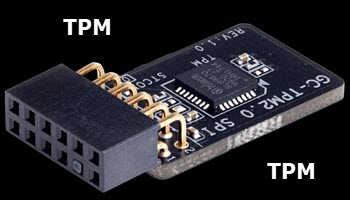Microsoft has recently published a document that attempts to convince Windows 10 users that TPM is worth the upgrade.
Windows 11 is quickly making up ground on Windows 10 in market share, but Windows 10 remains the predominant Windows operating system, and Microsoft will not be happy with that situation.
Microsoft has always presented TPM as the cornerstone of Windows 11’s enhanced security. However, several notable security experts disagree and have stated publicly that the only thing TPM secures is DRM (Digital Rights Management).
- Please read: The Sinister Truth About TPM
Microsoft’s Huge Mistake
Microsoft has obviously decided that, when it comes to upgrading from Windows 10 to Windows 11, TPM is the major stumbling block for users. However, is Microsoft barking up the wrong tree?
According to the majority of user complaints regarding Windows 11’s requirements, it is the CPU restriction rather than TPM that is preventing the upgrade. Common user comments are along the lines of, “I have TPM 2.0 enabled but cannot upgrade because my 7th gen CPU is not supported.”
By introducing requirements for both TPM and CPUs, Microsoft has created a ridiculous situation. Consider the following:
- TPM is supported by many 7th-generation CPUs
- Imposing the TPM requirement alone automatically eliminates any CPUs that do not support TPM from the upgrade path
- Consequently, the CPU requirement is redundant, unnecessary, and double-dipping
More On TPM
I am of the opinion that TPM could possibly be effective in a corporate environment where, because multiple networked PCs are operated by multiple users, there is also an enhanced vulnerability. However, for your average home users, I cannot see that TPM is the security be-all and end-all that Microsoft would have us believe.
- You also might like: Why Windows 10 Will Stick Around For Some Time Yet
BOTTOM LINE:
TPM is a source of annoyance for many users, but it is obviously not the main upgrade stumbling block that Microsoft perceives, which is, in fact, the totally unnecessary CPU limitation.
As usual, your thoughts via the comments are most welcome.
—


Absolutely agree, and Security Week states, “Security Defects in TPM 2.0 Spec Raise Alarm”. However, after Windows 10 end-of-life, I can continue using it on old hardware for specific purposes, but dual-boot with Linux for native apps (e.g., LibreOffice, Calibre, Firefox and Thunderbird) and for all the Windows executables that run well in wine (e.g., 7-Zip, IrfanView, Sumatra PDF, PDF-XChange Editor).
Microsoft should be forced to pay massive fines in compensation for the millions of tons of computer hardware that will be consigned to landfill. All because perfectly good and powerful enough PCs cannot run Windows 11 because they have a 7th Gen CPU or less and the ridiculous requirement for a TPM chip that will sooner or later likely be hacked and made redundant anyway.
I cannot believe “so-called” environmentalists aren’t demonstrating outside Microsoft offices worldwide over this issue. Just goes to show how genuine they really are about actual environmental issues.
I will be running LTSC and using Rufus on any re-installs to avoid the ridiculous Redmond Way requirements for Windows 11. I have in fact been doing so on my current systems for many months without any issues (even on those that are in fact Win 11 compatible) and have received all the updates as usual. When and “if” Microsoft attempts to block those systems there will soon be another “workaround” which I will quickly adopt.
Have two machines bith with 8+core gen 7 CPU, 32 gb memory and both have TDP 2.9 activated. Darn if I am replacing them. If I can not get updates in a few years, then will switch to Apple.
It’s not worth it to me. That’s why I recently transition to Linux full time. I’d been trying to wean myself off Windows for some twelve years, all the while increasingly dissatisfied with M$ tactics of command and control. This latest was just the thing needed to push me out of the M$ ecosystem for good.
Time for a cooling off period. I own 2 very old computers which barely meet the Windows 10 requirement. They are without any TPM socket but still working. Not sure if I should replace them or pay for an alternate security patch.
I also have plenty of paid software which runs on Windows and what many fail to take into consideration is that M$ has been providing FREE operating systems for years. Also when you purchase new computers, they come with Windows already installed. So how is M$ making any money? No need to answer.
I do not like the new imposed changes M$ is throwing our way. But weighing the pros and cons, I will stay with Windows for now, Mindblower!